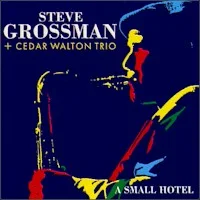Year: 1993
File: MP3@320K/s
Time: 49:47
Size: 114,4 MB
Art: Front
(10:09) 1. Arabia
( 8:12) 2. Wee Dot
( 7:20) 3. If I Had You
(16:06) 4. Blues March
( 7:58) 5. Along Came Betty
Cedar Walton's sextet recorded this session before an appreciative audience at Sweet Basil in New York in 1993. Joining the pianist for this date were trumpeter Philip Harper, tenor saxophonist Javon Jackson, trombonist Steve Turre, bassist David Williams and drummer Billy Higgins. The recording was taped during two August nights at the club; alto saxophonist Lou Donaldson appears on "Wee Dot" and "If I Had You."
Four of the sextet are alumni of Art Blakey's Jazz Messengers; moreover, Lou Donaldson's work experience with Blakey predates the founding of his Jazz Messengers. Horace Silver was with the ensemble at that time (the early 1950s) and likes to refer to The Jazz Messengers as "the Art Blakey College of Musical Education." Blakey's working unit remained at the vanguard of hard bop for 36 years, and included well-known jazz artists such as Benny Golson, Jackie McLean, Curtis Fuller, Lee Morgan, Cedar Walton, Freddie Hubbard, Keith Jarrett, Wayne Shorter, Chick Corea, and Wynton Marsalis (Blakey, who passed away in October 1990, used to introduce himself to audiences as "Mrs. Blakey's bambino, Arturo").
Curtis Fuller's "Arabia" features Turre's expressive trombone. J.J. Johnson's "Wee Dot" includes Walton's exciting hard bop piano work and fours from the ever-tasteful Billy Higgins. "If I Had You" is a gentle ballad that features Donaldson. Benny Golson's "Blues March" and "Along Came Betty" provide the most excitement, as each soloist pushes the envelope. Harper and Jackson are particularly creative in their solo spots, weaving quiet mouse-like lines together and building them into uproarious shouts. Art Blakey taught them well.By Jim Santella
https://www.allaboutjazz.com/bambino-cedar-walton-evidence-music-review-by-jim-santella
Personnel: Piano – Cedar Walton; Alto Saxophone, Guest – Lou Donaldson (tracks: 2, 3); Bass – David Williams (2); Drums – Billy Higgins; Tenor Saxophone – Javon Jackson; Trombone – Steve Turre; Trumpet – Philip Harper
Four of the sextet are alumni of Art Blakey's Jazz Messengers; moreover, Lou Donaldson's work experience with Blakey predates the founding of his Jazz Messengers. Horace Silver was with the ensemble at that time (the early 1950s) and likes to refer to The Jazz Messengers as "the Art Blakey College of Musical Education." Blakey's working unit remained at the vanguard of hard bop for 36 years, and included well-known jazz artists such as Benny Golson, Jackie McLean, Curtis Fuller, Lee Morgan, Cedar Walton, Freddie Hubbard, Keith Jarrett, Wayne Shorter, Chick Corea, and Wynton Marsalis (Blakey, who passed away in October 1990, used to introduce himself to audiences as "Mrs. Blakey's bambino, Arturo").
Curtis Fuller's "Arabia" features Turre's expressive trombone. J.J. Johnson's "Wee Dot" includes Walton's exciting hard bop piano work and fours from the ever-tasteful Billy Higgins. "If I Had You" is a gentle ballad that features Donaldson. Benny Golson's "Blues March" and "Along Came Betty" provide the most excitement, as each soloist pushes the envelope. Harper and Jackson are particularly creative in their solo spots, weaving quiet mouse-like lines together and building them into uproarious shouts. Art Blakey taught them well.By Jim Santella
https://www.allaboutjazz.com/bambino-cedar-walton-evidence-music-review-by-jim-santella
Personnel: Piano – Cedar Walton; Alto Saxophone, Guest – Lou Donaldson (tracks: 2, 3); Bass – David Williams (2); Drums – Billy Higgins; Tenor Saxophone – Javon Jackson; Trombone – Steve Turre; Trumpet – Philip Harper
Bambino: Plays the Music of Art Blakey









